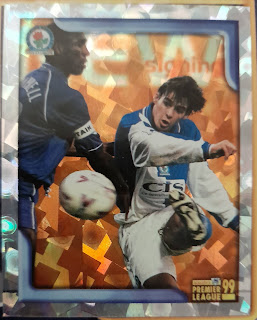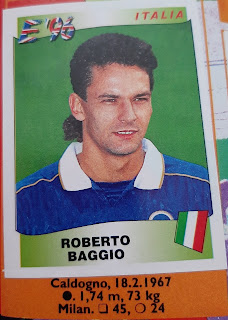U56: Matt Jansen, Blackburn Rovers, Merlin’s Premier League 99 Official Sticker Collection, Transfer Update Edition
During Sven Goran-Eriksson’s five-year stint as England manager the Three Lions lost only five competitive games, two of which were a result of the dreaded penalty shootout, and the Swede resigned from the post with a better win percentage than his far more popular predecessors Bobby Robson and Terry Venables. He led England to three consecutive major tournaments in which they reached the quarterfinal stage making him the nation’s third most successful manager after Alf Ramsey and some bloke called Gareth Southgate. Eriksson’s England beat Germany 5-1 in Munich and scored a cathartic victory over Argentina at the 2002 World Cup thanks to a David Beckham penalty and, at times, actually played some half decent football.
This glowing CV is probably not what Eriksson is best remembered for, however, as his perceived failure to win a major international tournament whilst managing England’s supposed ‘golden generation’ meant that he was continually criticised by the sporting press. Sven didn’t help himself by engaging in high-profile affairs, being tricked into media stings without downing a pint of wine or, perhaps worst of all in the eyes of the tabloids, being Swedish. Results and nationality aside Eriksson’s selection policy did, at times, leave a lot to be desired. Like Kevin Keegan before him he struggled to solve the supposed ‘left-sided problem’ and handed caps to the likes of Alan Thompson and David Dunn before shoving Paul Scholes out wide for a laugh. Then, in his last World Cup campaign in 2006, he called up 17-year old Theo Walcott ahead of the considerably more prolific Jermain Defoe and Andy Johnson and then proceeded to play him for the grand total of zero minutes in Germany.
Sven had previous for such behaviour. Back in 2002 Blackburn Rovers’ Matt Jansen had scored sixteen goals in all competitions to help the side to a solid top half finish in the Premier League and win the League Cup, an even more impressive feat when you consider they had only just returned to the top flight after two seasons in the second tier. Jansen had been instrumental in helping Rovers to this promotion with an impressive 24 goals in the previous campaign and was beginning to deliver on the potential he had shown in his earlier career at Carlisle United and Crystal Palace. He had been invited to David Beckham’s pre-tournament party and had even been measured for his official suit when Rovers manager Graeme Souness told him to avoid an injury in their penultimate game against Liverpool so sure was he of the striker’s inclusion in Eriksson’s plans for Japan and South Korea. Jansen duly did as he was told and even capped his performance with a goal in front of the watching England manager. The next day the squad was announced and said Three Lions’ boss had decided to take veteran defender Martin Keown out to Asia instead.
While Keown played the grand total of zero minutes in England’s march to the quarterfinals Matt Jansen decided to take a trip to Rome with his girlfriend, now wife, Lucy. They hired a scooter and took in the famous sights of the eternal city but on the second day of their trip they were hit by a taxi just fifty yards from their hotel. Jansen spent the next six days in a coma. Incredibly he recovered quickly and, once he had regained the ability to walk, was back in pre-season training with Blackburn Rovers ahead of the 2002/03 campaign.
Understandably it took a while for Jansen to return to first team action but he managed 21 appearances and four goals for Rovers and Coventry City where he spent a brief loan spell. What was clear, however, was that some of the magic that had seen the forward so close to international recognition had gone. Despite attempts to force his way back into the Blackburn side in the subsequent seasons the club’s management saw that Jansen had not fully recovered from his accident and he fell further down the pecking order at Ewood Park. Behind the scenes he sought help from renowned psychologist Professor Steve Peters who highlighted that Jansen was struggling to move on from mistakes and had lost the instinctive streak that had made him such a handful in his early career. Jansen’s anxiety was heightened by his relegation to the substitute’s bench and after one last push to force his way into the Rovers first team he was released in January 2006.
A brief spell at Sam Allardyce’s Bolton Wanderers failed to reignite his career and Jansen spent the next three years looking to maintain his fitness without finding a permanent contract. In March 2009 he joined Wrexham, then in the Conference Premier, on a short-term contract before heading to Leigh Genesis, managed by his former Rovers teammate Garry Flitcroft in the Northern Premier League. He finished his career at Chorley where he took over as manager of the club in 2015. Now in the National League North he secured an impressive eighth place finish in his first season in charge before leading the Magpies to the play-off final in 2017 where they lost after extra time to Halifax Town. The next season saw another promotion push end in play-off defeat to Harrogate Town at which point Jansen resigned his post.
In 2019 Matt Jansen opened up about his experiences in professional football in a compelling interview with BBC Radio Lancashire ahead of the release of his aptly entitled autobiography ‘What Was, What Is and What Might Have Been’. Despite a decent set of qualifications he struggled to answer basic questions set to him by a neurosurgeon in the weeks following his accident and he began to overthink the most simple of footballing movements such as trapping and passing. As his struggles on the pitch increased his depression and anxiety deepened leading to problems with alcohol and, besides his wife and three children, he found himself often drifting with little purpose as his once glittering career tailed off.
I remember Matt Jansen as one of the bright sparks in Palace’s dismal 1997/98 campaign and the distinct lack of resentment I felt when he left to play at a higher level. To see his career stall was always saddening and the revelations of the traumas he endured as he attempted to get it back on track brought back similar feelings. Prior to his accident Matt Jansen had scored 72 goals in just over 200 appearances for Carlisle, Palace and Blackburn. After 2002 he managed just 23 more across twelve years. In his own words he “was the happiest man in the world in 2002 when I was in Rome before the accident. If I could go back there, 100% I would.” If such a dream could become a reality perhaps a certain national team manager would make a different call.





Comments
Post a Comment